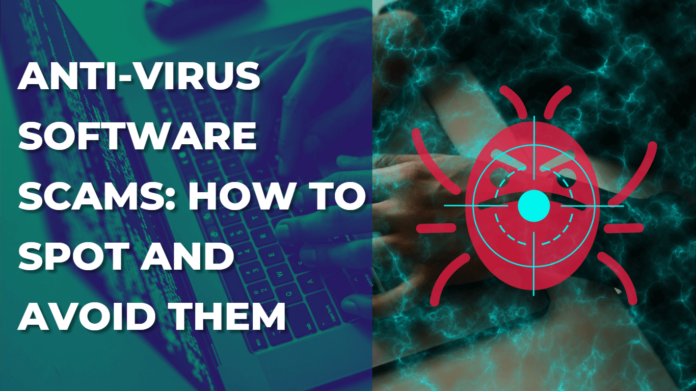There is a saying that advises consumers not to believe everything they read on the Internet. This rule applies particularly to claims made by “anti-malware” providers.
On the surface, the “anti-virus software” may appear to be a valuable tool protecting your personal information and electronic device. However, if one merely digs slightly deeper, one will find it’s anything but.
Allow me to elaborate in greater detail on what fraudulent antivirus software is, how to detect, avoid, and finally eliminate it.
What are Antivirus Software and falsified anti-malware?
An antivirus application scans a computer for viruses, worms, and other malware and detects, identifies, and removes them.
Falsified antivirus software, on the other hand, deceives users into believing that their computer is infected with malware.
Users are presented with several falsely detected viruses accompanied by an option to “fix” or “repair” the computer.
In this way, the hacker has the opportunity to ask for payment, lock the computer, or infect the device with additional malware.
Fraudulent antivirus software: how does it work?
Two types of fraudulent antivirus software exist, legitimate antivirus software modified with malware like viruses, adware and spyware.
The second type consists of falsified software developed by unknown and questionable companies.
Warning signs to watch out for:
Alarming or urgent messages accompanied by excessive notifications. For the most part, anti-malware providers avoid disturbing users unless an emergency arises.
Fraudulent anti-virus software “providers”, on the other hand, do the opposite. Messages will appear on a website or in an unsolicited email informing users that their antivirus software has expired or is about to.
The application will alert users regardless of whether viruses exist on their devices and urge them to take immediate action to eliminate the malware.
In-app adverts that appear to notify the user of a virus or problem on their computer or device. Mobile ads, especially those containing malicious software, may appear as GIFs designed to look like antivirus updates.
Without even providing any information, users’ computers or mobile devices can become infected with malware simply by clicking on the “antivirus update” advertisement.
An additional fee is charged when the software “detects” and “removes” malware. Several counterfeit antivirus programs appear to scan your computer for infections and request payment to remove them.
Regardless of whether it is a free trial version, a legitimate antivirus application will detect an infection, remove it, and provide a report, without requesting an additional fee.
With every scan, the “antivirus software” detects at least a dozen infections. Even if it examines two seemingly harmless Word documents, you will in all likelihood receive an infection alert.
What can you do to avoid being targeted by falsified antivirus software?
Avoid pop-up ads or banners claiming your computer is infected or your antivirus software is nearing its expiration date, particularly if it is not even installed on your device.
Furthermore, virtually all companies providing antivirus software, automate subscription renewal and thus won’t send you an email regarding the subscription’s renewal.
Maintain a clean browsing history. Fraudsters can track your browsing history and utilize the information to provide you with advertisements for “antivirus software”, should that have been your search query.
Prior to installing any security program or software, research the company that supplies the product.
Avoid downloading software via hyperlinks directing you to dubious websites, as this can lead to malware installation.
Avoid suspicious emails, particularly mail claiming to be from credible companies but redirecting users to a different website from the company’s current one.
Fortunately, these are easier to detect since many of these emails often contain grammatical or spelling errors and do not refer to users by their names.
Conduct a brief search before taking any action. Trusted and well-known antivirus software such as Avast is well-represented in Google search results, which cannot be said of false antivirus software.
The easiest way to determine a company’s legitimacy is to simply Google its name. A user review, even one that is unfavourable, is a good sign as it signifies the credibility of the company and what it promised it delivers: to protect users from malware and viruses.
However, one that yields no Google search results…well, you can put two and two together.
How to remove malware from your device?
The first thing you should do if you detect malware on your device is to uninstall the file, assuming the infection was caused by its installation.
The next step requires the installation of legitimate antivirus software. Despite uninstalling the file, many software applications, upon installation, include additional documents, which provide terms and conditions and further critical information.
As a consequence, you may be unable to find the remaining files associated with the false antivirus software on your computer or mobile device, even after software removal!
The importance of antivirus software lies in the fact that it can remove any remaining traces of malware.
Nevertheless, it is imperative to conduct some research regarding antivirus software providers.
Additionally, you may wish to invest in a subscription-based antivirus application rather than one free of charge, as it provides a greater range of benefits in addition to being more reliable and secure.
The last thing you would want to do is install yet another fraudulent antivirus application in an effort to repair the damage caused by the previous version.
Steps you may need to take based on the infection severity
Ensure that your antivirus software is up to date, or if possible, remove and reinstall it, as there is a significant possibility that the malware has compromised your current version, rendering it ineffective.
Apart from shutting down your computer or mobile device, you should also disconnect your internet connection to minimize the risk of information leakage.
If possible, change your Google password using an uninfected device, such as a mobile device.
The final step is to contact your bank (or the financial institution you used to make the payment) in the event that your financial information or funds have already been provided to the fraudulent program.
In accordance with the Federal Trade Commission, it does not matter whether you paid with a credit card, debit card, or even a gift card, be sure to contact your bank.
In addition to protecting your account from further withdrawals, you may also be entitled to a refund from your lender.
Even though the internet has provided us with numerous opportunities and resources, it has also opened up a new can of worms: the issue of privacy.
The good news is that there are security solutions to safeguard one’s personal information and electronic device.
Nevertheless, one of the most effective precautions to avoid falling prey to the bait is to be wary of the information you read on the internet.

